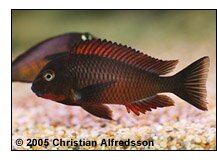|
I'm sure many of you have tried, and given up on keeping Tropheus. I have almost thrown in the towel myself at various times. I write this short article with the hope you will find this information useful and, more importantly, it will help to keep your Tropheus alive. Over the years I have learned a few things that work well, mostly through trial and error, compounded by strings of good and bad luck. By no means is this article meant to be a comprehensive "how to" list. It is merely meant to help you successfully prepare and care for your Tropheus once they arrive. This has worked well for me; others may have different thoughts and experiences. A wise and prudent aquarist should: Never order Tropheus unless you have metronidazole (metro) available. This medication, in my opinion, is the only reliable cure for bloat. If you wait to order it when you see bloat appear, by the time your metro arrives, you fish will be too far gone. Having some metro on hand for the Tropheus arrival allows you to treat the tank for bloat in an unconventional way. I have found that it works very well if you soak their food in some dissolved metro the first few days after you get them. Tropheus will eat like pigs when you first get them so it is a good way to get the metro into their system. This should nip bloat before it begins. Using this method I have never had a case of bloat with my new arrivals. There are many advocates that say you should not feed your Tropheus for the first few days after arrival. Supposedly this helps them adjust and lessens their chance of getting bloat. My problem with this approach is that after a few days the Tropheus may not be eating, due to bloat, requiring you to dose the entire tank. A few metro soaked flakes/pellets in their bellies upon arrival may have prevented this from occurring in the first place. Always get some of the food that the shipper is feeding them, this will help you to avoid giving them new food and causing them to bloat. You should slowly wean them off of whatever they are eating and feed them a spirulina flake/pellet diet. There are numerous suppliers of good, quality spirulina based flakes and pellets out there. Europeans are fond of using a shrimp mix as a staple food source for their Tropheus. While I do not like to use this type of food, they have had success. To keep it simple, I recommend spirulina. Over filtration is best for Tropheus. They are voracious eaters and require clean water. If you over-filtrate you can do water changes every 2-3 weeks and it's no problem. If one of your Tropheus fails to eat, in my experience, it is because they have bloat or it is a female with a mouthful of eggs. By now you are saying "Ok great, thanks for the info. How do I know my fish has bloat?" Good question. It has been my experience that if you're Tropheus does not eat; you should assume it has bloat. Clamped fins with a swaying, swimming motion is another sign. Tropheus resting on the tank bottom is yet another cautionary sign. The easiest signs to detect, however, are a swollen stomach and long, stringy white feces. If you see these in your tank, begin treatment immediately. If you can detect and begin treatment quickly you should not lose any fish. Tropheus are actually very easy to take care of once you get them past the initial arrival phase. Keep them on their spirulina based diet, maintain water quality, and all should be right with the world. Related Searches; |
Care and Maintenance of Tropheus
This is cached version of this article in case that you can not access original website. Please visit the URL below to access original version !
aquarium.support is neither affiliated with the authors of this page nor responsible for its content.
aquarium.support is neither affiliated with the authors of this page nor responsible for its content.
Summary : by Leigh Kissane
Categories : English, Aquarium, CICHLIDS, AFRICAN, Zebra - Albino, Pseudotropheus zebra, Zebra - Blue BB, Pseudotropheus zebra, Zebra - Red, Pseudotropheus zebra, Zebra - Red Top Cobalt, Pseudotropheus zebra

 Perhaps you are in the initial stages of, what I like to call, the "Tropheus frenzy." This often begins by browsing the internet, looking at thousands of multi-colored fish, and soaking up as much information as you can regarding these wonderful fish. For a few of us, the next step involves a trip to our local fish store in the hopes of seeing some in person. Deciding which variant to keep is one of the harder questions you must answer. Who can keep just one after all?
Perhaps you are in the initial stages of, what I like to call, the "Tropheus frenzy." This often begins by browsing the internet, looking at thousands of multi-colored fish, and soaking up as much information as you can regarding these wonderful fish. For a few of us, the next step involves a trip to our local fish store in the hopes of seeing some in person. Deciding which variant to keep is one of the harder questions you must answer. Who can keep just one after all?